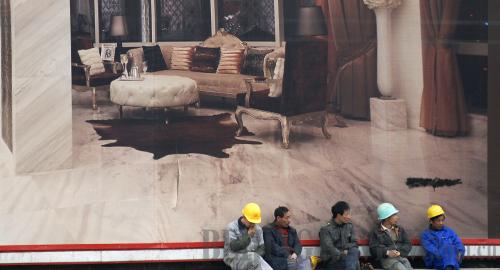|
 |
|
STRIKING CONTRAST: Construction workers rest in front of a billboard advertising a luxury real estate property they are currently building in Beijing on April 17 (CFP) |
Vermilion wooden doors, gray brick walls and exquisitely carved marble stones—the elements typical of traditional upper-class Chinese architecture have been replicated in the Courtyards on Canal Bank, a luxury residential area in Beijing, to reflect the wealth and status of property owners.
The residential compound has been rated as one of China's top 10 luxury estates in 2014. The promotional material for the compound claims that the grey bricks are made of volcanic rocks formulated more than 100 million years ago and quarried from a seabed 1,000 meters beneath the ocean's surface. Many trees in the gardens are more than 100 years old and have been painstakingly transplanted from various locations across the country. It was said that every Ginkgo tree in the gardens is worth more than $30,000. A single property here, between 350-3,500 square meters in area, costs somewhere between millions and tens of millions of dollars.
Although the prices are out of the reach of the average people in China, they are quite affordable for the country's super-rich.
Yawning gap
More than three decades of economic boom in China has brought enormous wealth to the country. From 1980 to 2013, China's GDP soared from $189.40 billion to more than $9.24 trillion, according to the World Bank's World Development Indicators data. That is to say its national wealth multiplied approximately 49 times. Meanwhile, per-capita GDP also surged from $193 to $6,807, representing a 35-fold growth.
When initiating reform and opening-up, the late leader of China Deng Xiaoping said that some people should be allowed to get rich first. In the 1980s, private businesses sprouted up across the country. Now, the country's richest citizens own fortunes in the billions. On September 23, Hurun Research Institute released the Hurun Rich List 2014. On the list, 354 Chinese residents own more than $1 billion, up 39 from last year, whereas 10 years ago, that number was only three.
Alibaba Group's founder Jack Ma was recently crowned the country's richest man. The recent initial public offering of Alibaba Group on the New York Stock Exchange swelled his fortune to $25 billion, up five times on last year, according to Hurun Research Institute.
Of the top 10 on the Hurun Rich List 2014, five, including Baidu's founder Robin Li, Tencent Group's Pony Ma, JD.com's Richard Liu and Xiaomi Technology's Lei Jun, made their money from Internet technology. Wealth gleaned from real estate has introduced two billionaires, namely Wanda Group's Wang Jianlin and Reignwood's Yan Bin, to the list, whereas in 2013, six of the top 10 were in real estate.
On September 12, Hurun Research Institute also published a report on China's high net worth individuals, defined as people with net worth exceeding 10 million yuan ($1.6 million).
The report said that these millionaires primarily consist of four types of people: private business owners, professional stock market investors, real estate investors and high-salaried corporate executives, who respectively accounted for 55, 10, 15 and 20 percent of the total.
According to the institute, as of the end of 2013, China had a total of 1.09 million high net-worth individuals, up 3.8 percent from the previous year. Among them, the number of super-rich, defined as individuals with personal wealth of at least $16 million, reached 67,000.
Some of China's super-rich are also among the wealthiest on this planet. According to Forbes, of the world's 1,645 billionaires in 2014, China accounts for 152, more than Russia's 111, and second only to the 492 of the United States.
Although the society has become much more affluent overall, wealth has been distributed more unevenly.
Now the country's top 1 percent of households own more than one third of all wealth, whereas the bottom 25 percent own about 1 percent of the total, according to a report released by the Institute of Social Science Survey of Peking University in July.
By the UN's poverty standard, China had 128 million people still living under the poverty line, said President Xi Jinping on March 25, 2013.
Peking University's report said China's wealth inequality has surged in the past few decades. The Gini coefficient for wealth disparity increased from 0.45 in 1995, to 0.55 in 2002 and to 0.73 in 2012. A zero means complete equality, and a one means absolute inequality. Some experts consider a Gini coefficient higher than 0.4 to be undesirable.
The report also revealed that Chinese households' consumption patterns are also polarized, with some living hedonistic lifestyles and some living very frugally.
| 